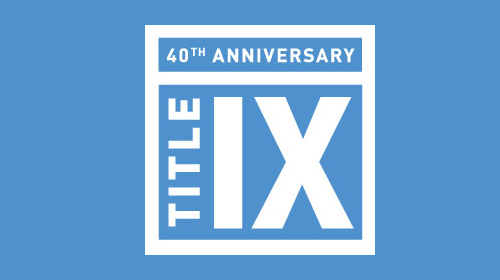
By Elliot Mamet
On June 23rd, 1972, President Nixon signed Title IX into law. Nearly 40 years later, the passage of Title IX is viewed as an unequivocal milestone in the struggle to protect, defend and expand civil liberties. As we celebrate Title IX’s 40th birthday, it is worth reflecting on its significance, as well as on the challenges that lie ahead.
Title IX mandates that federally funded institutions may not exclude or discriminate from an educational program or activity on the basis of sex. The law leverages federal funds in order to require equal opportunity for men and women. There are exceptions to Title IX (like sororities or the Boy Scouts), although in general, Title IX has applied quite broadly and unilaterally to different institutions. Through Title IX, the doors have opened a little wider for equal opportunity in the United States.
Title IX shattered the stereotype that women are too “fragile” or “weak” to play sports, but Title IX goes so much further than sports. By prohibiting discrimination based on non-conformity with gender stereotypes, Title IX has been used as an effective tool for defending the civil rights and civil liberties of LGBT students. Additionally, Title and harassment based on students’ gender identity, change of sex, and/or transgender status.
Yet even with these successes, enforcing Title IX still has its challenges. One important concern for policymakers is applying Title IX in a way that is conscious of the diversity of gender expression. In a society where gender and sexual orientation mean different things to different people, self-identifying as the normative “male” or “female” . A sound approach to Title IX regulation would prioritize meeting the needs of participants in a particular sport or program. Federally funded institutions should allow students to participate in programs and sports based on the gender with which they identify, in a way that is conscious to individual needs. In this way, programs and activities could act as a safe space where program leaders are more sensitive to the diversity of gender expression.
Looking back at the past 40 years under Title IX, it is clear that Title IX has grown to reflect a fundamental mindset—that human institutions, whether the soccer team or a PhD program—shouldn’t shut out certain categories of people a priori. If the Declaration of Independence and the Emancipation Proclamation mean anything at all to us today, surely they must be interpreted as another step on our quest to “,” as Martin Luther King Jr. said. And surely, in its own way, Title IX reflects that quest. It is today, nearly 40 years after Title IX was passed into law, that Title IX’s lessons must be heeded with the utmost resolve.
Elliot Mamet is the summer Colorado College Public Interest Fellow at the ACLU of Colorado. He is an incoming sophomore at Colorado College, a four-year, private liberal arts school, where he is studying political science.

